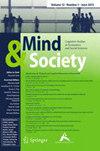The Bhagavad Gita as the Epitome of Indian Psychology vis-à-vis Modern psychology
Q1 Arts and Humanities
引用次数: 0
Abstract
The Indian tradition has always revered the Bhagavad Gita as a text of marvellous universality with the ability to throw light on many aspects of an individual’s life journey. Further, its importance is underscored by its preeminence as a source book of Indian Psychology. Indian Psychology is a modern appellation given to the extraction, compilation and consolidation, from Indian sources, of the principles of psychology based on the framework of concepts and categorisation of the western tradition of psychology. This article examines the deep insights into the human psyche as presented and intuited from the Bhagavad Gita and consolidates them into maxims. The examination of Indian Psychology is guided by Advaita Vedanta - which is one of the windows of interpreting the Bhagavad Gita. The generic and particular principles of Indian Psychology as seen through the lens of the Bhagavad Gita are then studied in apposition with the principles of modern psychology. This study yields an interesting set of observations about the common ground between the two disciplines: indicating what Indian Psychology could learn from Modern Psychology; and the unique insights that Indian Psychology offers which could contribute to a better understanding and handling of human existential crisis and its resolution through better informed existential quests. In an attempt to give a practical orientation, the article examines briefly the principles of Indian psychology that influenced the life of three national leaders who have publicly acknowledged their debt to the Bhagavad Gita, having been life-long students of the text viz. Lokamanya Tilak, Sri Aurobindo and Mahatma Gandhi. The uniqueness of their personality/leadership will be correlated to the Bhagavad Gita’s repository of the Principles of Indian Psychology.《博伽梵歌》是印度心理学与-à-vis现代心理学的缩影
印度传统一直尊崇《博伽梵歌》,认为它具有不可思议的普世性,能够照亮个人生命旅程的许多方面。此外,它的重要性强调了其卓越的印度心理学的来源书。印度心理学是一个现代的称谓,指的是在西方心理学传统的概念和分类框架的基础上,从印度来源提取、汇编和巩固心理学原则。这篇文章探讨了从《博伽梵歌》中呈现和直觉的对人类心灵的深刻见解,并将它们整合成格言。印度心理学的考试是由《吠檀多》指导的——它是解释《博伽梵歌》的窗口之一。通过《博伽梵歌》的镜头看到的印度心理学的一般和特殊原则,然后与现代心理学的原则进行对比研究。这项研究产生了一系列关于这两个学科之间共同点的有趣观察:表明印度心理学可以从现代心理学中学到什么;以及印度心理学提供的独特见解,可以帮助我们更好地理解和处理人类存在危机,并通过更明智的存在主义探索来解决这一危机。为了给出一个实际的方向,本文简要地考察了影响了三位国家领导人的生活的印度心理学原则,他们公开承认他们对《博伽梵歌》的债务,他们是这部文本的终身学生,即Lokamanya Tilak, Sri Aurobindo和Mahatma Gandhi。他们个性/领导力的独特性将与《博伽梵歌》中的印度心理学原理资源库相关。
本文章由计算机程序翻译,如有差异,请以英文原文为准。
求助全文
约1分钟内获得全文
求助全文
来源期刊

Mind and Society
Arts and Humanities-Philosophy
CiteScore
2.30
自引率
0.00%
发文量
5
期刊介绍:
Mind & Society is a journal for ideas, explorations, investigations and discussions on the interaction between the human mind and the societal environments. Scholars from all fields of inquiry who entertain and examine various aspects of these interactions are warmly invited to submit their work. The journal welcomes case studies, theoretical analysis and modeling, data analysis and reports (quantitative and qualitative) that can offer insight into existing frameworks or offer views and reason for the promise of new directions for the study of interaction between the mind and the society. The potential contributors are particularly encouraged to carefully consider the impact of their work on societal functions in private and public sectors, and to dedicate part of their discussion to an explicit clarification of such, existing or potential, implications.Officially cited as: Mind Soc
 求助内容:
求助内容: 应助结果提醒方式:
应助结果提醒方式:


